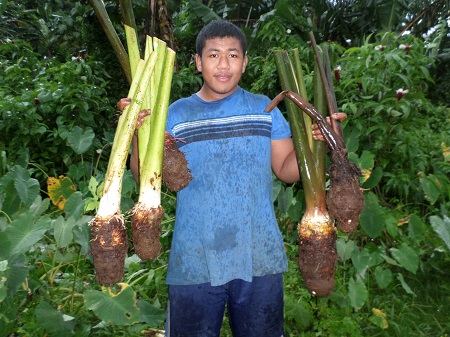
Farmer Virgil Simeona of Aloau displays some of the taro grown on his land as part of the ongoing ASCC-CNR Taro Breeding Program. Research is underway at ASCC-CNR to develop new varieties of taro that are both disease resistant and compatible with coastline environments. (Courtesy Photo)

Farmer Virgil Simeona of Aloau displays some of the taro grown on his land as part of the ongoing ASCC-CNR Taro Breeding Program. Research is underway at ASCC-CNR to develop new varieties of taro that are both disease resistant and compatible with coastline environments. (Courtesy Photo)
ASCC-CNR Research Aims to Improve American Samoa’s Taro
July 29, 2015
By James Kneubuhl, ASCC Press Officer
Scientists still cannot explain the 1993 arrival in these islands of the taro leaf blight, a leaf disease caused by a fungus, but once here, it quickly spread by wind and rain to all of American Samoa and Samoa, decimating all the traditional varieties of taro grown here at the time. Fortunately, disease-resistant varieties of taro from Asia and other parts of the Pacific were subsequently introduced to all of Samoa to replace the traditional varieties, but research continues in pursuit of new species of taro ideally suited to our unique environment.
With assistance from the American Samoa Department of Agriculture, the Community and Natural Resources (CNR) division of the American Samoa Community College (ASCC) has been conducting a taro breeding project for the last three years, following the participation by CNR staff members in a taro breeding workshop in Samoa conducted by University of the South Pacific plant breeder Tolo Iosefa and the Secretariat of the Pacific Community (SPC). “Carrying on from the workshop, our goal is to develop taro varieties that are disease resistant, high yielding, and of good eating quality,” explained CNR Horticulturist Ian Gurr, “and we hope in the near future to begin evaluating for tolerance to salinity, in order to develop taro species ideal for low lying coastal areas such as the wetlands in Aunu’u and Manu’a.”
Taro breeding programs occurring in several areas of the Pacific using taro from different areas of the world as parent material increase the genetic variation of the resulting new taro varieties developed. This increases the chances of having taro present that will have resistance to diseases that might occur here in the future. “Working with some of the local taro farmers we have been able to develop and evaluate many varieties produced here at ASCC-CNR, using parent material obtained by SPC from many areas of the world,” said Gurr. “We have a few varieties that we feel are promising and we are increasing the numbers of those varieties now.” Gurr and his staff have worked with six local taro farmers, who have allowed the use of their land and also assisted with planting, maintaining and evaluating the taro.
While crossbreeding taro species may sound simple, the familiar dietary staple has a far more complex scientific profile than many might imagine. Approximately 2,200 varieties of taro are known to exist, with 196 varieties or “cultivars” now being grown for research purposes at the Center for Pacific Crops and Trees in Fiji. Gurr sees this diversity of cultivars as a valuable asset to producing a sustainable variety of taro suited to local conditions. “With new plant diseases arriving, and existing diseases changing, the genetic material of taro from other areas of the world increases the chance that if a new taro disease occurs here, there will be some varieties that will have the necessary resistance. The traditional varieties we had in Samoa before 1993 were all susceptible to the taro leaf blight disease, but the new varieties have genetic material that makes them resistant. Also, with climate change and sea levels rising, there is a need to identify taro varieties that are salt tolerant for islands and areas where taro is grown in coastal and wetland areas, such as Aunu’u and Manu’a.”
With food produced that incorporates genetically modified organisms (GMOs) becoming an increasing source of controversy, Gurr addressed the question of whether the creation of new taro varieties should entitle the creator to a copyright or ownership of them. “The taro in our taro improvement program are not GMOs but are produced using traditional plant breeding methods,” he said. “We use parent material from several other countries such as Samoa, Hawaii, Palau, and the Philippines, with an aim towards improving food security. Making a patent on a new variety of food taro and charging others to be able to obtain it doesn’t seem right.”
For more information on taro research at CNR, contact Ian Gurr at 699-1575.
